Hydrobiologist Vesela Evtimova: Most Lakes in Antarctica Absorb CO2, Contribute to Its Reduction in Atmosphere
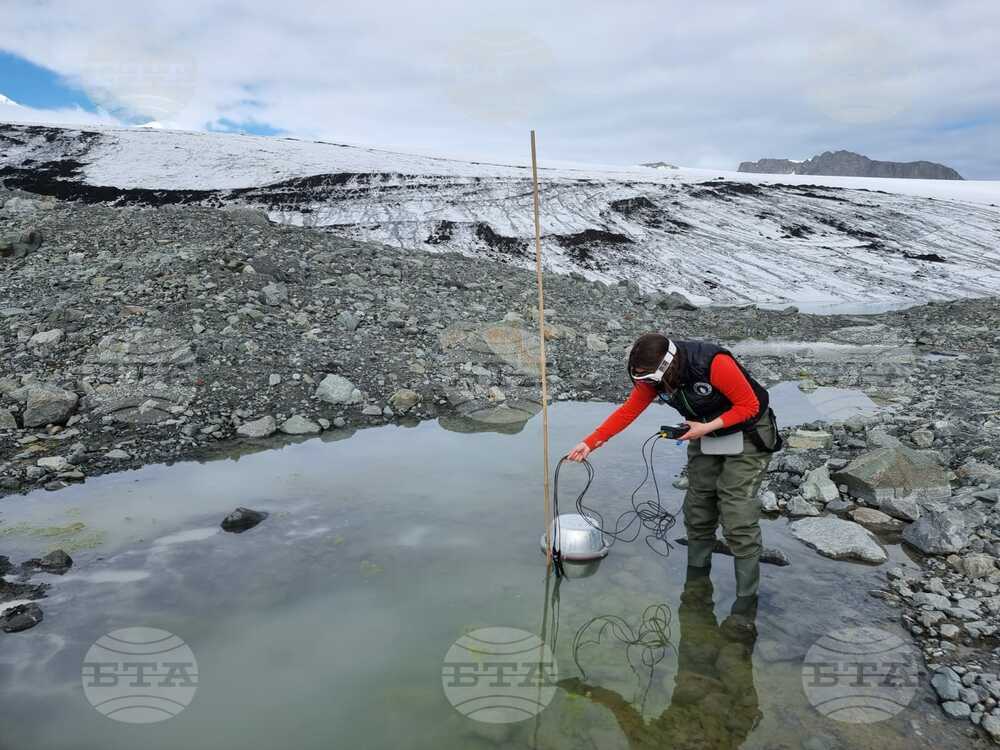
Hydrobiologist Vesela Evtimova: Most Lakes in Antarctica Absorb CO2, Contribute to Its Reduction in Atmosphere
LIVINGSTON ISLAND, 02.03.2023
Data from 2022 shows that most lakes in Antarctica are absorbing CO2, but we are yet to analyse the data from the second project year until we reach the final answer, said Chief Assistant Professor Vessela Evtimova, hydrobiologist at the Institute of Biodiversity and Ecosystem Research at the Bulgarian Academy of Sciences (BAS) and participant in the 31st Bulgarian Antarctic expedition.
The two-year international project, which Evtimova leads, investigates the functioning and adaptations of freshwater ecosystems and the organisms that occur in them under extreme polar conditions, including under conditions of intense ultraviolet radiation. The study consists of several components. One of them is the CO2 measurement in lakes on Livingstone Island, which is done with the help of measuring cameras that provide information on whether the lakes are receiving or releasing carbon dioxide. The other task is studying organisms living in these lakes, while the third involves studying their survival mechanisms in such extreme conditions.
BTA Photo: Konstantin Karagyozov
news.anonymous.signup
news.anonymous.login
Data from 2022 shows that most lakes in Antarctica are absorbing CO2, but we are yet to analyse the data from the second project year until we reach the final answer, said Chief Assistant Professor Vessela Evtimova, hydrobiologist at the Institute of Biodiversity and Ecosystem Research at the Bulgarian Academy of Sciences (BAS) and participant in the 31st Bulgarian Antarctic expedition.
The two-year international project, which Evtimova leads, investigates the functioning and adaptations of freshwater ecosystems and the organisms that occur in them under extreme polar conditions, including under conditions of intense ultraviolet radiation. The study consists of several components. One of them is the CO2 measurement in lakes on Livingstone Island, which is done with the help of measuring cameras that provide information on whether the lakes are receiving or releasing carbon dioxide. The other task is studying organisms living in these lakes, while the third involves studying their survival mechanisms in such extreme conditions.
BTA Photo: Konstantin Karagyozov
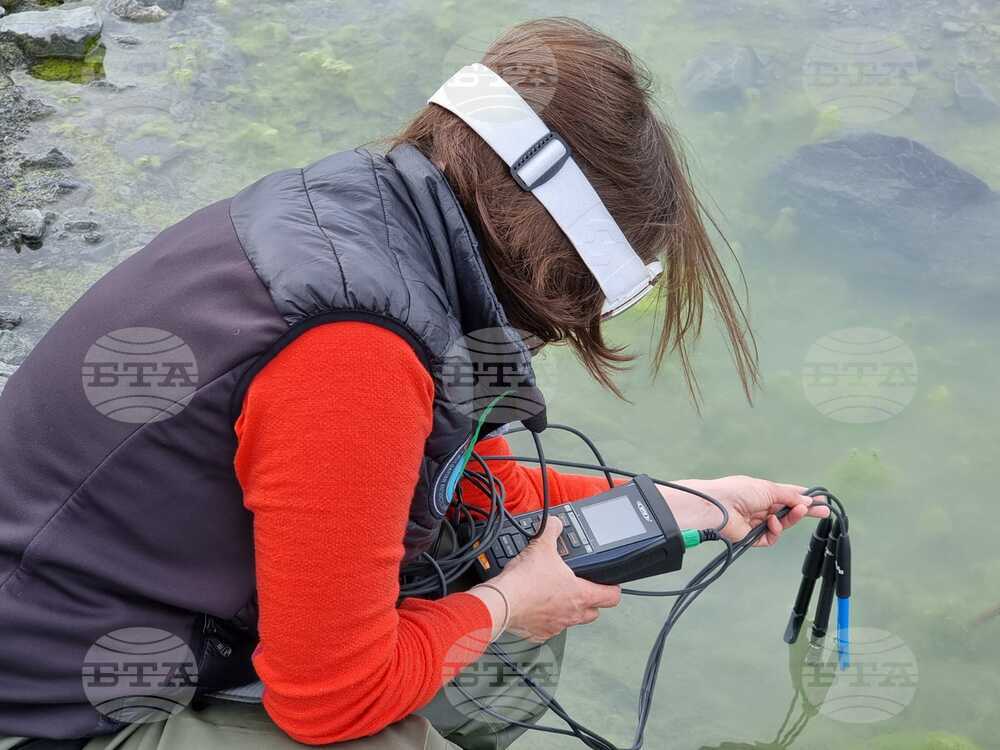
Hydrobiologist Vesela Evtimova: Most Lakes in Antarctica Absorb CO2, Contribute to Its Reduction in Atmosphere
LIVINGSTON ISLAND, 02.03.2023
Data from 2022 shows that most lakes in Antarctica are absorbing CO2, but we are yet to analyse the data from the second project year until we reach the final answer, said Chief Assistant Professor Vessela Evtimova, hydrobiologist at the Institute of Biodiversity and Ecosystem Research at the Bulgarian Academy of Sciences (BAS) and participant in the 31st Bulgarian Antarctic expedition.
The two-year international project, which Evtimova leads, investigates the functioning and adaptations of freshwater ecosystems and the organisms that occur in them under extreme polar conditions, including under conditions of intense ultraviolet radiation. The study consists of several components. One of them is the CO2 measurement in lakes on Livingstone Island, which is done with the help of measuring cameras that provide information on whether the lakes are receiving or releasing carbon dioxide. The other task is studying organisms living in these lakes, while the third involves studying their survival mechanisms in such extreme conditions.
BTA Photo: Konstantin Karagyozov
news.anonymous.signup
news.anonymous.login
Data from 2022 shows that most lakes in Antarctica are absorbing CO2, but we are yet to analyse the data from the second project year until we reach the final answer, said Chief Assistant Professor Vessela Evtimova, hydrobiologist at the Institute of Biodiversity and Ecosystem Research at the Bulgarian Academy of Sciences (BAS) and participant in the 31st Bulgarian Antarctic expedition.
The two-year international project, which Evtimova leads, investigates the functioning and adaptations of freshwater ecosystems and the organisms that occur in them under extreme polar conditions, including under conditions of intense ultraviolet radiation. The study consists of several components. One of them is the CO2 measurement in lakes on Livingstone Island, which is done with the help of measuring cameras that provide information on whether the lakes are receiving or releasing carbon dioxide. The other task is studying organisms living in these lakes, while the third involves studying their survival mechanisms in such extreme conditions.
BTA Photo: Konstantin Karagyozov
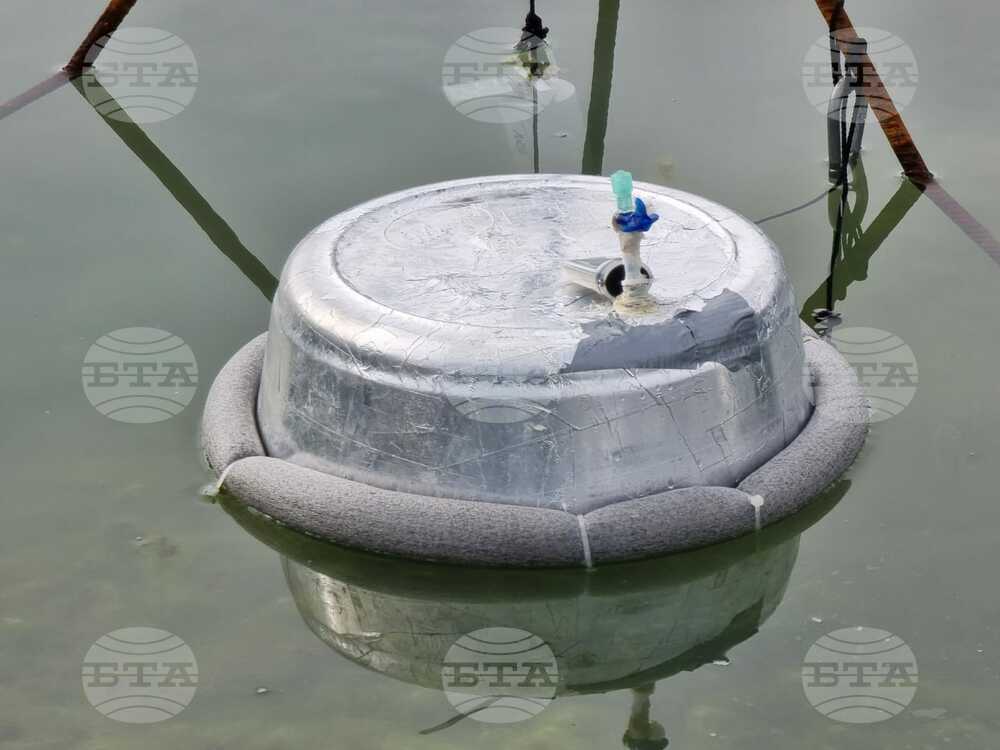
Hydrobiologist Vesela Evtimova: Most Lakes in Antarctica Absorb CO2, Contribute to Its Reduction in Atmosphere
LIVINGSTON ISLAND, 02.03.2023
Data from 2022 shows that most lakes in Antarctica are absorbing CO2, but we are yet to analyse the data from the second project year until we reach the final answer, said Chief Assistant Professor Vessela Evtimova, hydrobiologist at the Institute of Biodiversity and Ecosystem Research at the Bulgarian Academy of Sciences (BAS) and participant in the 31st Bulgarian Antarctic expedition.
The two-year international project, which Evtimova leads, investigates the functioning and adaptations of freshwater ecosystems and the organisms that occur in them under extreme polar conditions, including under conditions of intense ultraviolet radiation. The study consists of several components. One of them is the CO2 measurement in lakes on Livingstone Island, which is done with the help of measuring cameras that provide information on whether the lakes are receiving or releasing carbon dioxide. The other task is studying organisms living in these lakes, while the third involves studying their survival mechanisms in such extreme conditions.
BTA Photo: Konstantin Karagyozov
news.anonymous.signup
news.anonymous.login
Data from 2022 shows that most lakes in Antarctica are absorbing CO2, but we are yet to analyse the data from the second project year until we reach the final answer, said Chief Assistant Professor Vessela Evtimova, hydrobiologist at the Institute of Biodiversity and Ecosystem Research at the Bulgarian Academy of Sciences (BAS) and participant in the 31st Bulgarian Antarctic expedition.
The two-year international project, which Evtimova leads, investigates the functioning and adaptations of freshwater ecosystems and the organisms that occur in them under extreme polar conditions, including under conditions of intense ultraviolet radiation. The study consists of several components. One of them is the CO2 measurement in lakes on Livingstone Island, which is done with the help of measuring cameras that provide information on whether the lakes are receiving or releasing carbon dioxide. The other task is studying organisms living in these lakes, while the third involves studying their survival mechanisms in such extreme conditions.
BTA Photo: Konstantin Karagyozov
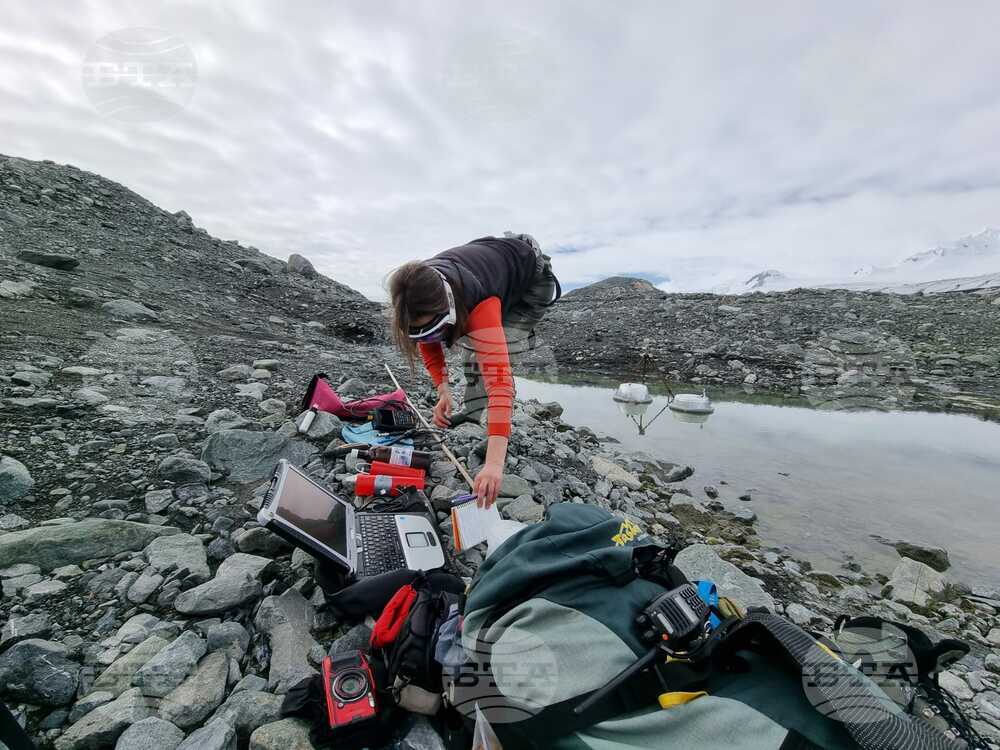
Hydrobiologist Vesela Evtimova: Most Lakes in Antarctica Absorb CO2, Contribute to Its Reduction in Atmosphere
LIVINGSTON ISLAND, 02.03.2023
Data from 2022 shows that most lakes in Antarctica are absorbing CO2, but we are yet to analyse the data from the second project year until we reach the final answer, said Chief Assistant Professor Vessela Evtimova, hydrobiologist at the Institute of Biodiversity and Ecosystem Research at the Bulgarian Academy of Sciences (BAS) and participant in the 31st Bulgarian Antarctic expedition.
The two-year international project, which Evtimova leads, investigates the functioning and adaptations of freshwater ecosystems and the organisms that occur in them under extreme polar conditions, including under conditions of intense ultraviolet radiation. The study consists of several components. One of them is the CO2 measurement in lakes on Livingstone Island, which is done with the help of measuring cameras that provide information on whether the lakes are receiving or releasing carbon dioxide. The other task is studying organisms living in these lakes, while the third involves studying their survival mechanisms in such extreme conditions.
BTA Photo: Konstantin Karagyozov
news.anonymous.signup
news.anonymous.login
Data from 2022 shows that most lakes in Antarctica are absorbing CO2, but we are yet to analyse the data from the second project year until we reach the final answer, said Chief Assistant Professor Vessela Evtimova, hydrobiologist at the Institute of Biodiversity and Ecosystem Research at the Bulgarian Academy of Sciences (BAS) and participant in the 31st Bulgarian Antarctic expedition.
The two-year international project, which Evtimova leads, investigates the functioning and adaptations of freshwater ecosystems and the organisms that occur in them under extreme polar conditions, including under conditions of intense ultraviolet radiation. The study consists of several components. One of them is the CO2 measurement in lakes on Livingstone Island, which is done with the help of measuring cameras that provide information on whether the lakes are receiving or releasing carbon dioxide. The other task is studying organisms living in these lakes, while the third involves studying their survival mechanisms in such extreme conditions.
BTA Photo: Konstantin Karagyozov
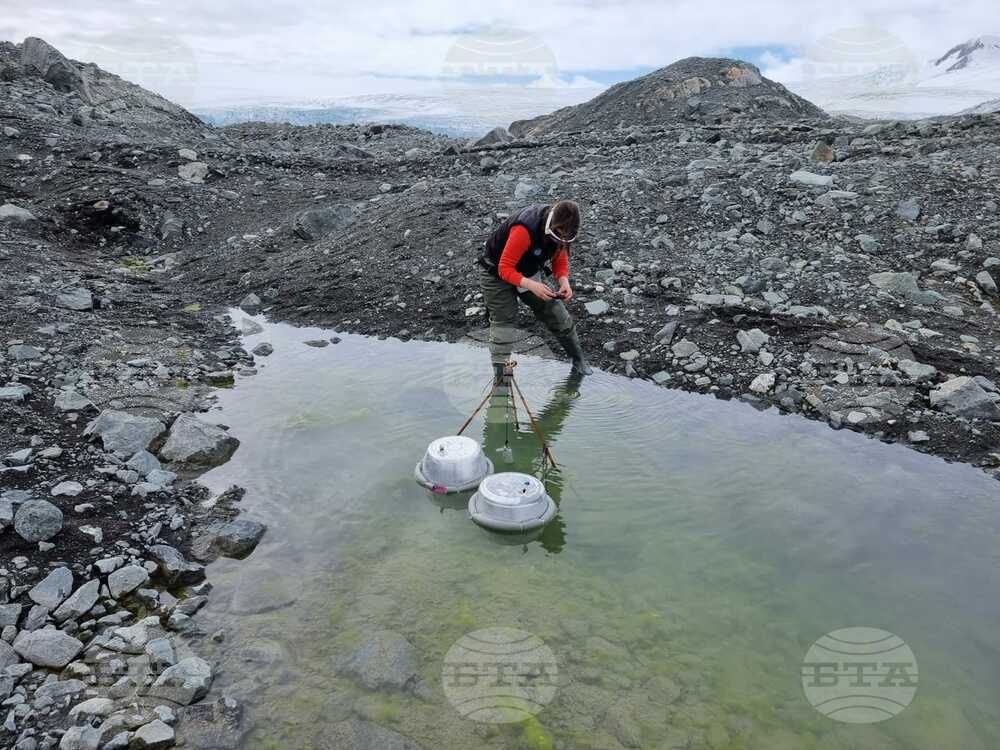
Hydrobiologist Vesela Evtimova: Most Lakes in Antarctica Absorb CO2, Contribute to Its Reduction in Atmosphere
LIVINGSTON ISLAND, 02.03.2023
Data from 2022 shows that most lakes in Antarctica are absorbing CO2, but we are yet to analyse the data from the second project year until we reach the final answer, said Chief Assistant Professor Vessela Evtimova, hydrobiologist at the Institute of Biodiversity and Ecosystem Research at the Bulgarian Academy of Sciences (BAS) and participant in the 31st Bulgarian Antarctic expedition.
The two-year international project, which Evtimova leads, investigates the functioning and adaptations of freshwater ecosystems and the organisms that occur in them under extreme polar conditions, including under conditions of intense ultraviolet radiation. The study consists of several components. One of them is the CO2 measurement in lakes on Livingstone Island, which is done with the help of measuring cameras that provide information on whether the lakes are receiving or releasing carbon dioxide. The other task is studying organisms living in these lakes, while the third involves studying their survival mechanisms in such extreme conditions.
BTA Photo: Konstantin Karagyozov
news.anonymous.signup
news.anonymous.login
Data from 2022 shows that most lakes in Antarctica are absorbing CO2, but we are yet to analyse the data from the second project year until we reach the final answer, said Chief Assistant Professor Vessela Evtimova, hydrobiologist at the Institute of Biodiversity and Ecosystem Research at the Bulgarian Academy of Sciences (BAS) and participant in the 31st Bulgarian Antarctic expedition.
The two-year international project, which Evtimova leads, investigates the functioning and adaptations of freshwater ecosystems and the organisms that occur in them under extreme polar conditions, including under conditions of intense ultraviolet radiation. The study consists of several components. One of them is the CO2 measurement in lakes on Livingstone Island, which is done with the help of measuring cameras that provide information on whether the lakes are receiving or releasing carbon dioxide. The other task is studying organisms living in these lakes, while the third involves studying their survival mechanisms in such extreme conditions.
BTA Photo: Konstantin Karagyozov
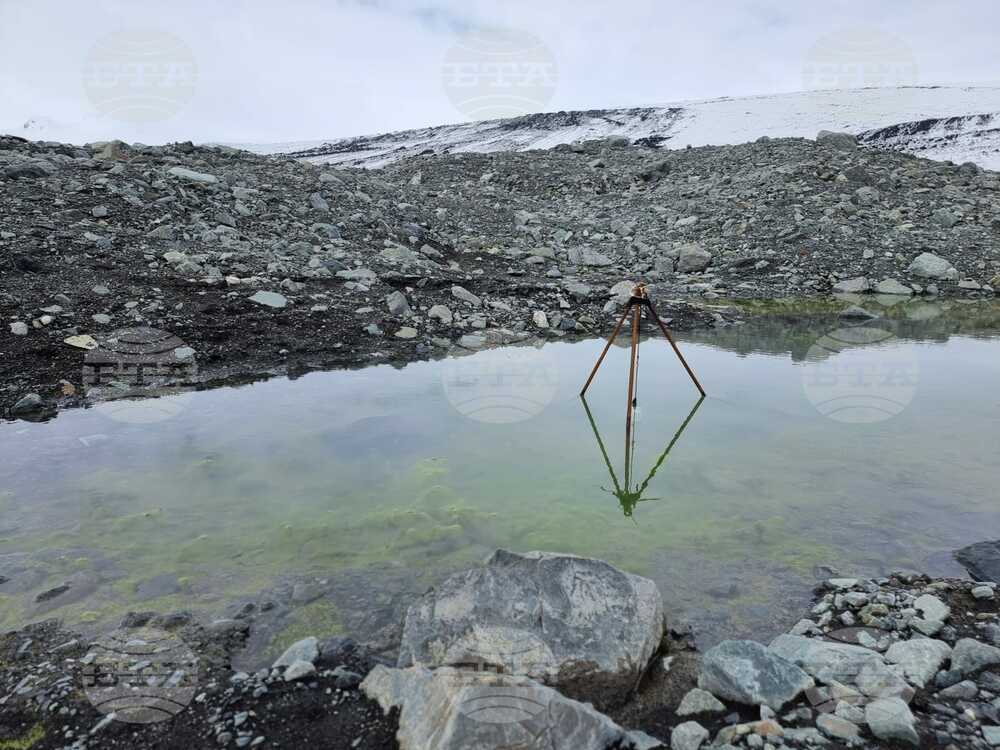
Hydrobiologist Vesela Evtimova: Most Lakes in Antarctica Absorb CO2, Contribute to Its Reduction in Atmosphere
LIVINGSTON ISLAND, 02.03.2023
Data from 2022 shows that most lakes in Antarctica are absorbing CO2, but we are yet to analyse the data from the second project year until we reach the final answer, said Chief Assistant Professor Vessela Evtimova, hydrobiologist at the Institute of Biodiversity and Ecosystem Research at the Bulgarian Academy of Sciences (BAS) and participant in the 31st Bulgarian Antarctic expedition.
The two-year international project, which Evtimova leads, investigates the functioning and adaptations of freshwater ecosystems and the organisms that occur in them under extreme polar conditions, including under conditions of intense ultraviolet radiation. The study consists of several components. One of them is the CO2 measurement in lakes on Livingstone Island, which is done with the help of measuring cameras that provide information on whether the lakes are receiving or releasing carbon dioxide. The other task is studying organisms living in these lakes, while the third involves studying their survival mechanisms in such extreme conditions.
BTA Photo: Konstantin Karagyozov
news.anonymous.signup
news.anonymous.login
Data from 2022 shows that most lakes in Antarctica are absorbing CO2, but we are yet to analyse the data from the second project year until we reach the final answer, said Chief Assistant Professor Vessela Evtimova, hydrobiologist at the Institute of Biodiversity and Ecosystem Research at the Bulgarian Academy of Sciences (BAS) and participant in the 31st Bulgarian Antarctic expedition.
The two-year international project, which Evtimova leads, investigates the functioning and adaptations of freshwater ecosystems and the organisms that occur in them under extreme polar conditions, including under conditions of intense ultraviolet radiation. The study consists of several components. One of them is the CO2 measurement in lakes on Livingstone Island, which is done with the help of measuring cameras that provide information on whether the lakes are receiving or releasing carbon dioxide. The other task is studying organisms living in these lakes, while the third involves studying their survival mechanisms in such extreme conditions.
BTA Photo: Konstantin Karagyozov
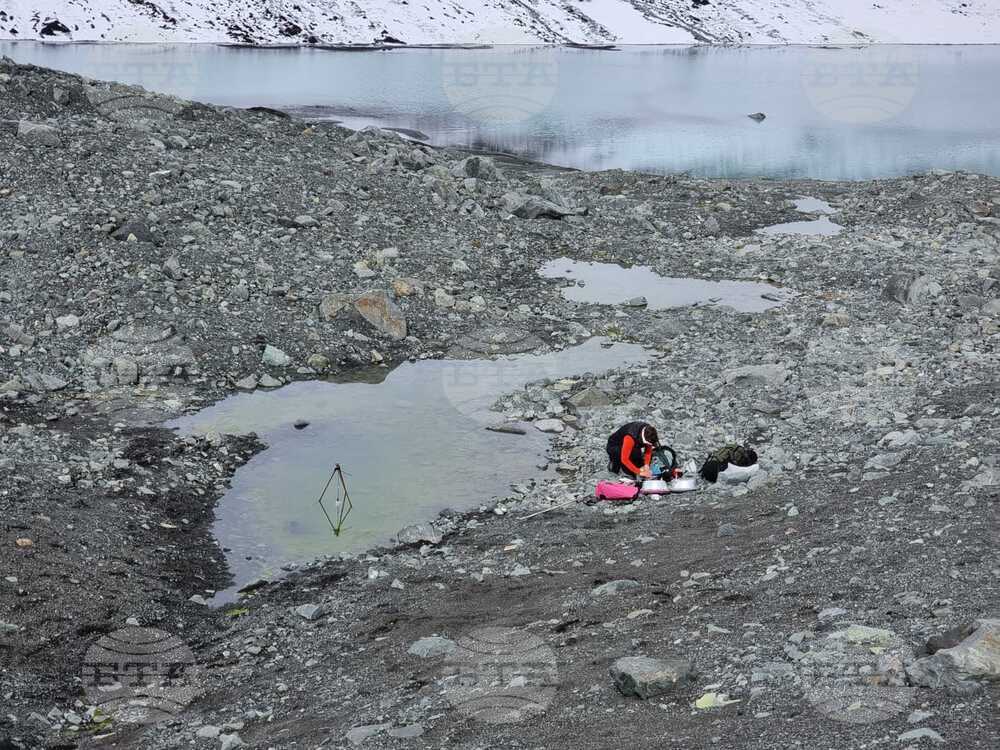
Hydrobiologist Vesela Evtimova: Most Lakes in Antarctica Absorb CO2, Contribute to Its Reduction in Atmosphere
LIVINGSTON ISLAND, 02.03.2023
Data from 2022 shows that most lakes in Antarctica are absorbing CO2, but we are yet to analyse the data from the second project year until we reach the final answer, said Chief Assistant Professor Vessela Evtimova, hydrobiologist at the Institute of Biodiversity and Ecosystem Research at the Bulgarian Academy of Sciences (BAS) and participant in the 31st Bulgarian Antarctic expedition.
The two-year international project, which Evtimova leads, investigates the functioning and adaptations of freshwater ecosystems and the organisms that occur in them under extreme polar conditions, including under conditions of intense ultraviolet radiation. The study consists of several components. One of them is the CO2 measurement in lakes on Livingstone Island, which is done with the help of measuring cameras that provide information on whether the lakes are receiving or releasing carbon dioxide. The other task is studying organisms living in these lakes, while the third involves studying their survival mechanisms in such extreme conditions.
BTA Photo: Konstantin Karagyozov
news.anonymous.signup
news.anonymous.login
Data from 2022 shows that most lakes in Antarctica are absorbing CO2, but we are yet to analyse the data from the second project year until we reach the final answer, said Chief Assistant Professor Vessela Evtimova, hydrobiologist at the Institute of Biodiversity and Ecosystem Research at the Bulgarian Academy of Sciences (BAS) and participant in the 31st Bulgarian Antarctic expedition.
The two-year international project, which Evtimova leads, investigates the functioning and adaptations of freshwater ecosystems and the organisms that occur in them under extreme polar conditions, including under conditions of intense ultraviolet radiation. The study consists of several components. One of them is the CO2 measurement in lakes on Livingstone Island, which is done with the help of measuring cameras that provide information on whether the lakes are receiving or releasing carbon dioxide. The other task is studying organisms living in these lakes, while the third involves studying their survival mechanisms in such extreme conditions.
BTA Photo: Konstantin Karagyozov
Buy a photo
Please confirm photo buy. If you continue this purchase will be deducted from your active subscription.
Photo Download
Please confirm photo download






